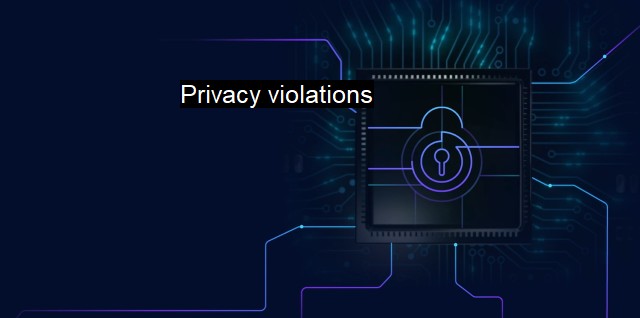What are Privacy violations?
Why Privacy Violations are a Rising Concern: Exploring Their Nature, Impact, and Preventive Measures in Cybersecurity and Antivirus Solutions
Privacy violations in the world of cybersecurity refer to instances where unauthorized individuals or systems gain access to confidential information. With everyone primarily using digital technology for everything from banking to health records, online communication to shopping, and many more, privacy violations have become very consequent. The fundamental principle of privacy is that an individual has the right to determine when, how, and to whom their personal information is revealed, if at all. once this right is breached, it becomes a violation that directly affects an individual’s cybersecurity.Cybersecurity plays a critical role in protecting user privacy. It involves the practice of securing networks, programs, computers, and data from unauthorized access or attack with the intent to exploit. Privacy violations in cybersecurity can therefore occur when attackers exploit vulnerabilities to gain unauthorized access to private information either for their personal gain or with an intent to cause harm.
In an increasingly interconnected digital information and communication infrastructure, computer systems, networks, and users are being exposed to a wide range of cyber threats including malware, phishing, hacking, data breaches, and denial-of-service attacks. These cybersecurity threats can result in data leakage leading further to privacy violations.
The common way these threats lead to privacy violations is when an attacker successfully installs malware on a user’s device or breaches the security defenses of a network. The malware can be engineered to spy on the user’s activities, collect sensitive information such as email addresses, passwords, credit card details, or even confidential enterprise information. This clearly represents a massive violation of privacy.
Attack methods such as phishing also infringe on user privacy. Phishing involves cybercriminals making seemingly innocent emails or messages appear to be from a legitimate institution to trick users into revealing sensitive information. Once an unsuspecting user falls for this trap, it results directly in a privacy violation.
Privacy violations can lead to devastating outcomes, from the destruction of one's online reputation or personal and financial loss to more alarming consequences like identity theft. It brings to light the importance of employing robust protection from cybersecurity threats, such as antivirus software.
Antivirus software is designed to detect, prevent, and remove malicious software threats like viruses, Trojans, and ransomware from a computer or computing network. As these threats often exploit inherent vulnerabilities in the systems to gain unauthorized entry and potentially access personal data, antivirus software forms a crucial defensive layer protecting user privacy.
Antivirus software works on several different levels to ensure user privacy. It scans the entirety of device memory, operating system, and systems files for known threats. It monitors the behavior of all applications and programs in real-time to detect and block any suspicious activity. it also warns users about possibly unsafe websites, helping to reduce the risk of privacy violations associated with risky online environments.
Antivirus software itself can also be a source of privacy violations if the proper guidelines and principles around software design and consent are not adequately followed. Therefore, it is important to choose reliable antivirus services that comply with stringent data protection norms.
Considering the advent and evolution of sophisticated cyberattacks, as well as increasingly complex and interconnected digital worlds, privacy violations have become a real and constant concern. Implementing comprehensive cybersecurity measures including robust, trustworthy antivirus protection is crucial in safeguarding individual privacy, protecting from potential impacts of privacy violations, and fostering a secure digital ecosystem. Failing to do so can lead to critical privacy violations—infringements that can result in enormous damages on a personal level, as well as a broader societal level, underscoring the imperative to secure data and protect privacy. Therefore, the significance of cybersecurity and antivirus in combating privacy violations cannot be understated.

Privacy violations FAQs
What is a privacy violation in the context of cybersecurity?
A privacy violation in the context of cybersecurity refers to the unauthorized access, use, or disclosure of personal information without the individual's consent. This could occur due to a data breach, malware infection, or social engineering attack.What are some examples of privacy violations that can occur through antivirus software?
Antivirus software can occasionally collect personal data from users, such as their browsing history or search queries. If this data is shared without proper consent or is not adequately protected, it can be considered a privacy violation. Additionally, if the antivirus software is hacked or contains vulnerabilities, it could lead to a breach of personal data.What are the consequences of a privacy violation in cybersecurity?
The consequences of a privacy violation can be severe, ranging from financial loss to reputational damage. For individuals, it could result in identity theft or fraud. For businesses, the fallout could include loss of customer trust, legal fines, and regulatory penalties.How can individuals protect themselves from privacy violations in cybersecurity?
Individuals can take several steps to protect themselves from privacy violations, including using strong passwords, enabling two-factor authentication, avoiding suspicious links and downloads, and being cautious when sharing personal information online. It is also important to keep antivirus software up to date and to regularly back up important data to minimize the impact of a potential breach.| | A | | | B | | | C | | | D | | | E | | | F | | | G | | | H | | | I | | | J | | | K | | | L | | | M | |
| | N | | | O | | | P | | | Q | | | R | | | S | | | T | | | U | | | V | | | W | | | X | | | Y | | | Z | |
| | 1 | | | 2 | | | 3 | | | 4 | | | 7 | | | 8 | | |||||||